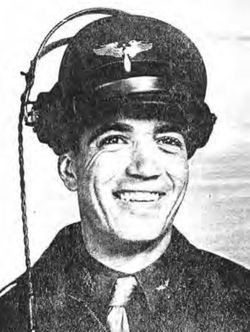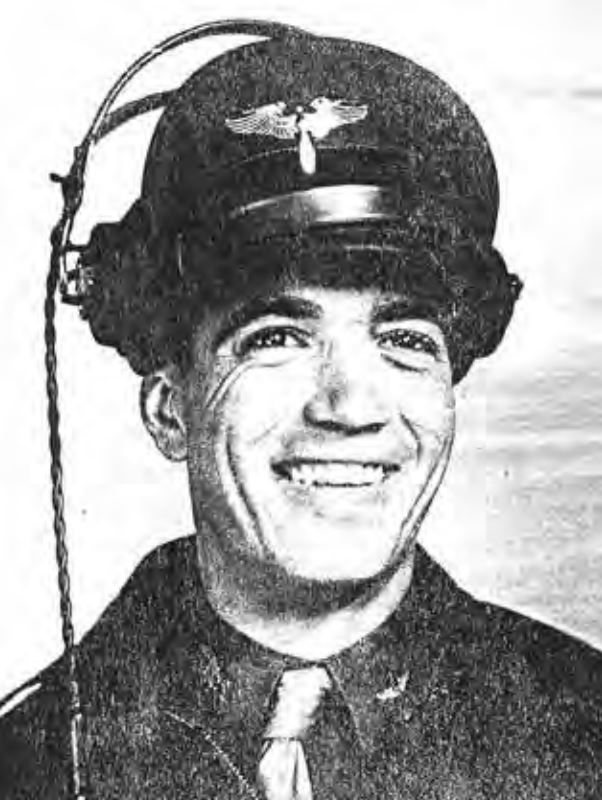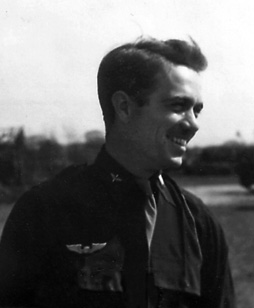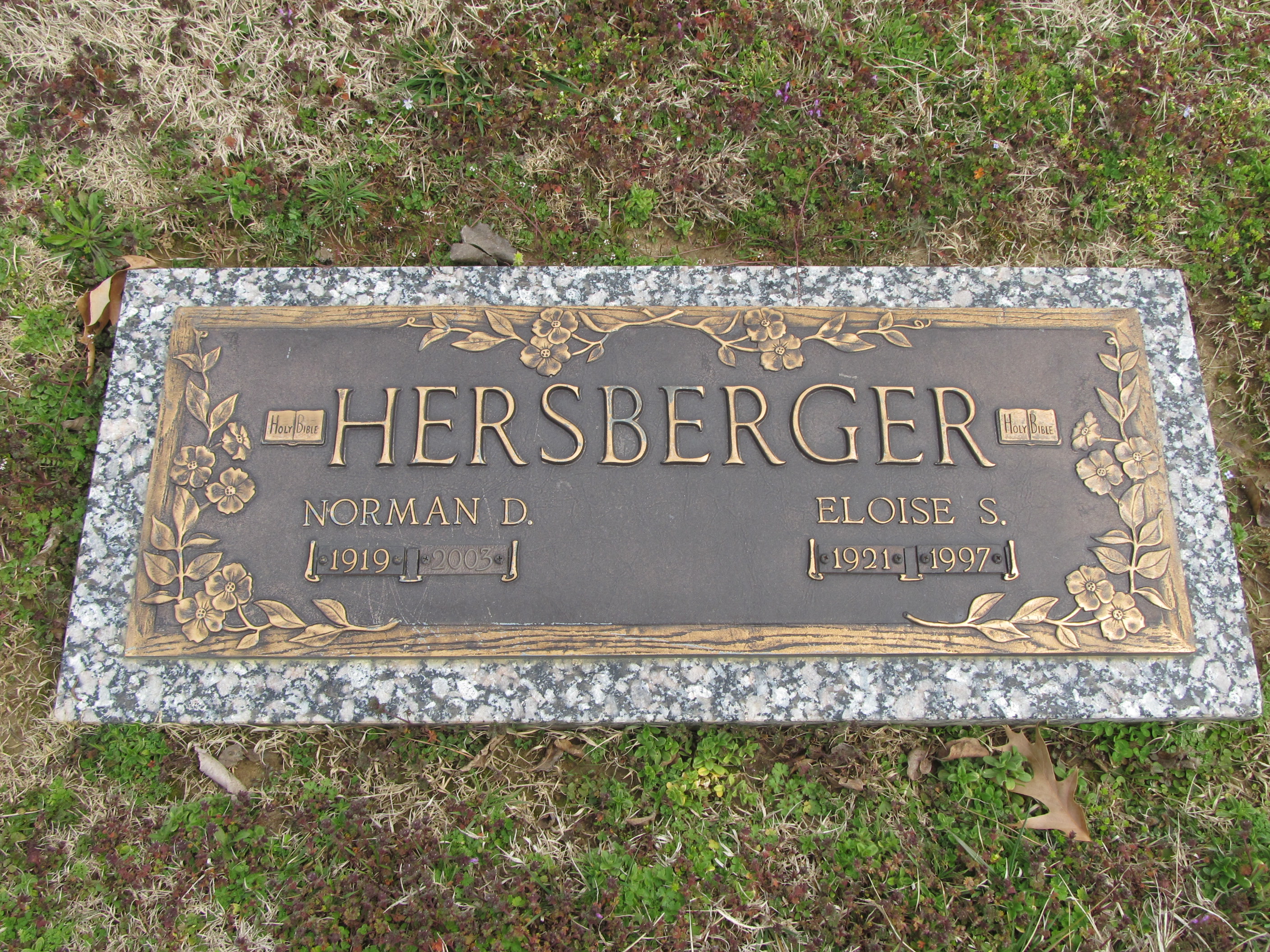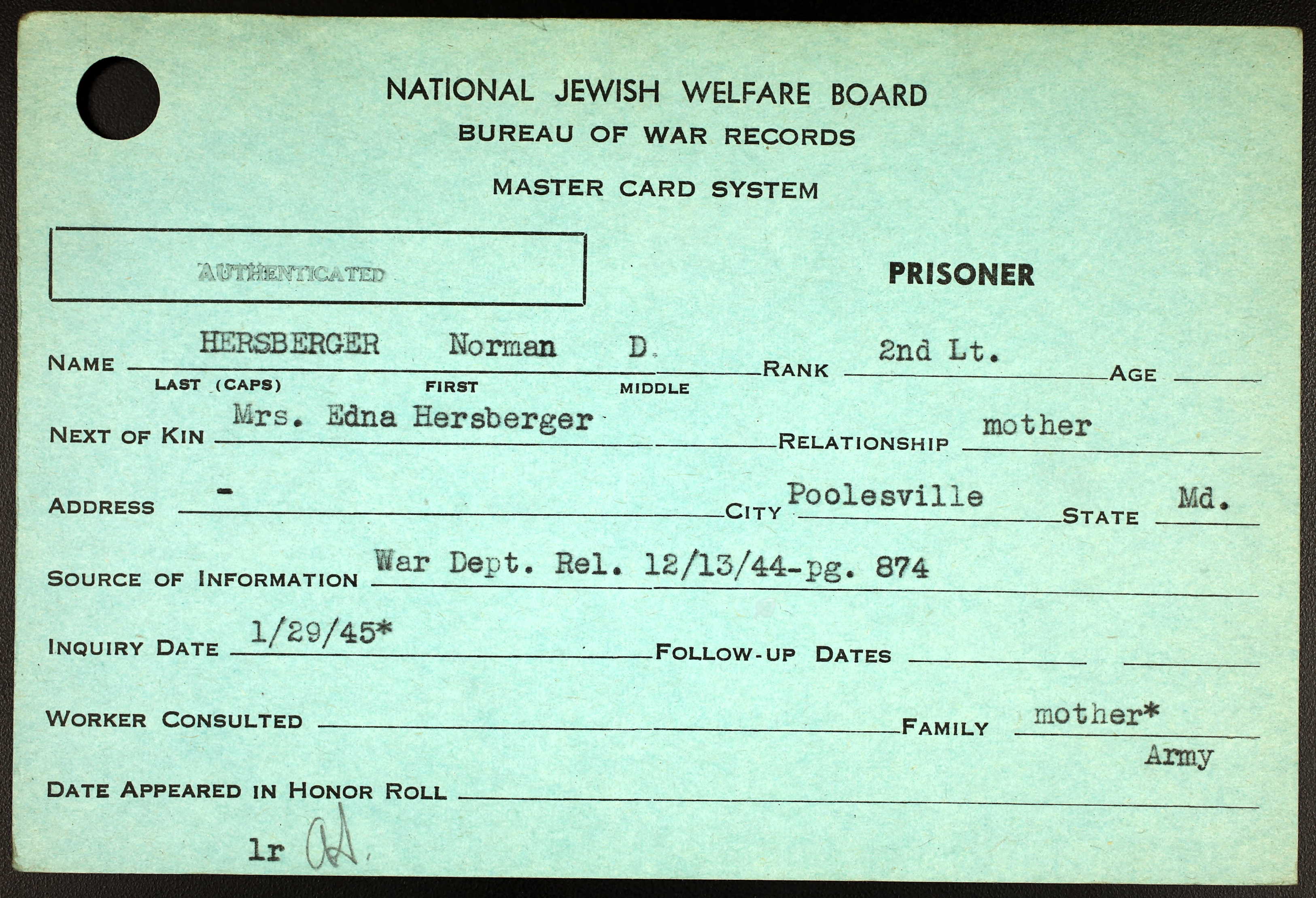Additional information provided by Find a Grave contributor Glenn Wallace (46802463):
Poolesville’s French Connection
By Rande Davis
Monocacy Monocle, August 23, 2019
When Marshall and Edna Hersberger left their homesteading farm in Canada in the 1920s to move to Poolesville, their vision about the future did not include their baby boy, Norman, becoming a hero to the French Resistance.
Norman Davis Hersberger was born Canada in 1919, but he and his three brothers, Marshall, Homer, and Wilson, were raised in Poolesville in a bungalow on West Willard Road. His family and friends always called him by his middle name, Davis, and upon graduating from Poolesville High School in 1938, he was still six years away from the day he would find himself parachuting from his Mustang fighter plane into enemy territory over Brittany, France.
It was the spring of 1944, just five weeks before D-Day, when the American pilot was rescued by the French Underground Resistance and hidden from the Nazis until they could pull off their planned escape to Spain. Davis was put “into hiding, using barns and villages, traveling by bicycle en route to Spain with the goal of reaching the American Embassy.” French resistance leader, Jean-Claude Moussat, and his compatriots traveled with him to Paris, holed up in an apartment for two weeks, put him on a train to Spain only for Hersberger to be caught by the Nazis in Bordeaux, where he had planned to stay only one night.
Upon his capture, Hersberger was taken to Gestapo headquarters in Bayonne, France, for interrogation. Through the interrogation and torture, Davis Hersberger gave only his name, rank, and serial number. Hersberger told The Commercial Appeal (newspaper in Memphis, Tennessee) in 1994 that “the guy got so irritated that I wouldn’t talk, he came from behind his desk and slapped me across the jaw. The next thing I knew was that I was on the floor.” An enforcer was brought in, and Hersberger was beaten by cane until it finally broke. They then turned to a rubber hose and, finally, a nightstick in an effort to get him to talk.
“I don’t know how long the beating lasted, but he must have gotten me in the head after all because the next thing I knew is that I woke up in a dark basement that had muddy puddles, a leak dripping from the ceiling, sharing a crowded cell on flea-infested straw pallets on the concrete.”
For resistance leader Jean-Claude Moussat and his fellow fighters, it would not be until 1985 that they would finally have the chance to personally thank Davis Hersberger. Moussat met an American named Phillip Schnell who was in France because his daughter was a foreign exchange student. After hearing about Hersberger from Moussat, Mr. Schnell took it upon himself to research the whereabouts of Davis Hersberger. When he discovered he was from Poolesville, Maryland he contacted town hall, which in turn put him into to contact with Charles Elgin, Sr. Mr. Elgin knew the Hersberger family well, and he informed Mr. Schnell that Norman was always known by his middle name, Davis. From this inquiry, Mr. Schnell was finally able to put Moussat and Hersberger in contact with one another.
Moussat wrote Hersberger, “It was courageous to bear the torture of the Gestapo. Without your courageous silence, the members of our own group and network would have been captured and killed by the Gestapo.” Hersberger wrote back to Moussat, “I am grateful for your aid in helping me attempt to escape to England. It’s too bad it didn’t work.”
After World War II, Davis met and married Mary Eloise Shoaf from Covington, Tennessee where they resided and raised their two children. While Davis Hersberger passed away a few years ago, he remained very humble about his wartime experience, only saying during 50th anniversary ceremonies in 1994 that “the capture and refusal to talk were just part of his duties as a member of the U.S. armed forces.”
Additional information provided by Find a Grave contributor Glenn Wallace (46802463):
Poolesville’s French Connection
By Rande Davis
Monocacy Monocle, August 23, 2019
When Marshall and Edna Hersberger left their homesteading farm in Canada in the 1920s to move to Poolesville, their vision about the future did not include their baby boy, Norman, becoming a hero to the French Resistance.
Norman Davis Hersberger was born Canada in 1919, but he and his three brothers, Marshall, Homer, and Wilson, were raised in Poolesville in a bungalow on West Willard Road. His family and friends always called him by his middle name, Davis, and upon graduating from Poolesville High School in 1938, he was still six years away from the day he would find himself parachuting from his Mustang fighter plane into enemy territory over Brittany, France.
It was the spring of 1944, just five weeks before D-Day, when the American pilot was rescued by the French Underground Resistance and hidden from the Nazis until they could pull off their planned escape to Spain. Davis was put “into hiding, using barns and villages, traveling by bicycle en route to Spain with the goal of reaching the American Embassy.” French resistance leader, Jean-Claude Moussat, and his compatriots traveled with him to Paris, holed up in an apartment for two weeks, put him on a train to Spain only for Hersberger to be caught by the Nazis in Bordeaux, where he had planned to stay only one night.
Upon his capture, Hersberger was taken to Gestapo headquarters in Bayonne, France, for interrogation. Through the interrogation and torture, Davis Hersberger gave only his name, rank, and serial number. Hersberger told The Commercial Appeal (newspaper in Memphis, Tennessee) in 1994 that “the guy got so irritated that I wouldn’t talk, he came from behind his desk and slapped me across the jaw. The next thing I knew was that I was on the floor.” An enforcer was brought in, and Hersberger was beaten by cane until it finally broke. They then turned to a rubber hose and, finally, a nightstick in an effort to get him to talk.
“I don’t know how long the beating lasted, but he must have gotten me in the head after all because the next thing I knew is that I woke up in a dark basement that had muddy puddles, a leak dripping from the ceiling, sharing a crowded cell on flea-infested straw pallets on the concrete.”
For resistance leader Jean-Claude Moussat and his fellow fighters, it would not be until 1985 that they would finally have the chance to personally thank Davis Hersberger. Moussat met an American named Phillip Schnell who was in France because his daughter was a foreign exchange student. After hearing about Hersberger from Moussat, Mr. Schnell took it upon himself to research the whereabouts of Davis Hersberger. When he discovered he was from Poolesville, Maryland he contacted town hall, which in turn put him into to contact with Charles Elgin, Sr. Mr. Elgin knew the Hersberger family well, and he informed Mr. Schnell that Norman was always known by his middle name, Davis. From this inquiry, Mr. Schnell was finally able to put Moussat and Hersberger in contact with one another.
Moussat wrote Hersberger, “It was courageous to bear the torture of the Gestapo. Without your courageous silence, the members of our own group and network would have been captured and killed by the Gestapo.” Hersberger wrote back to Moussat, “I am grateful for your aid in helping me attempt to escape to England. It’s too bad it didn’t work.”
After World War II, Davis met and married Mary Eloise Shoaf from Covington, Tennessee where they resided and raised their two children. While Davis Hersberger passed away a few years ago, he remained very humble about his wartime experience, only saying during 50th anniversary ceremonies in 1994 that “the capture and refusal to talk were just part of his duties as a member of the U.S. armed forces.”
Family Members
Sponsored by Ancestry
Advertisement
Explore more
Sponsored by Ancestry
Advertisement
